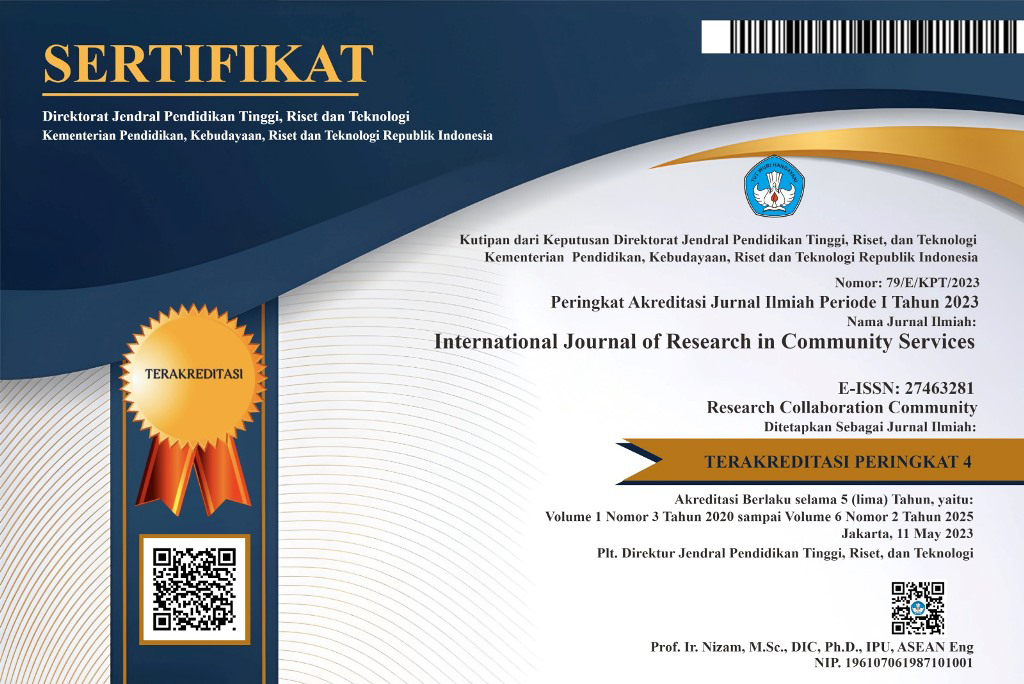Cultivating a Caring Attitude to the Environment and Waste Management in Public Elementary School (SDN) Godog, Garut, Indonesia
Abstract
Environmental problems are often encountered around us, but not everyone feels that these problems must be solved together. The holding of environmental education is expected to make community groups more concerned about cleanliness and health in their surrounding environment. This form of community service at SDN Godog 1 – 2 is carried out due to the fact that the school environment looks unorganized and the lack of waste management around the school. School streets that should look neat and clean are not visible, even around this school road is used as a dumping ground for scattered garbage without any trash cans. The method used in the implementation of this community service is the follow-up study method with a participatory approach. By providing material on the importance of managing waste, proper waste sorting and counseling on the dangers of waste that has polluted the environment. Students are taught directly the practice of managing waste using used bottles as handicrafts, cleaning the school environment and preserving the environment. By carrying out education about caring for the environment, it is hoped that students can play an active role in protecting the school environment by taking part in the practice of cleaning the environment, sorting out used snacks and reducing the use of plastic waste that has been rampant and polluting the surrounding environment. Because with the creation of an attitude of caring for the environment at an early age, it is hoped that environmental problems will reduce this waste and make a generation that loves environmental cleanliness.
Keywords
Full Text:
PDFReferences
Budihardjo, M. A., Wahyuningrum, I. F. S., Muhammad, F. I., & Pardede, R. (2019, November). The role of waste banks in the reduction of solid waste sent to landfill in Semarang, Central Java, Indonesia. In IOP Conference Series: Earth and Environmental Science (Vol. 337, No. 1, p. 012028). IOP Publishing.
Demirbas, A. (2011). Waste management, waste resource facilities and waste conversion processes. Energy Conversion and Management, 52(2), 1280-1287.
Desa, A., Ba’yah Abd Kadir, N., & Yusooff, F. (2012). Waste education and awareness strategy: towards solid waste management (SWM) program at UKM. Procedia-Social and Behavioral Sciences, 59, 47-50.
Fagnani, E., & Guimarães, J. R. (2017). Waste management plan for higher education institutions in developing countries: The Continuous Improvement Cycle model. Journal of Cleaner Production, 147, 108-118.
Grodzińska-Jurczak, M. (2003). The relation between education, knowledge and action for better waste management in Poland. Waste management & research, 21(1), 2-18.
Hantoko, D., Li, X., Pariatamby, A., Yoshikawa, K., Horttanainen, M., & Yan, M. (2021). Challenges and practices on waste management and disposal during COVID-19 pandemic. Journal of Environmental Management, 286, 112140.
Hoornweg, D., & Bhada-Tata, P. (2012). What a waste: a global review of solid waste management. Urban development series;knowledge papers no. 15. World Bank, Washington, DC. World Bank. https://openknowledge.worldbank.org/ handle/10986/17388 License: CC BY 3.0 IGO.
Jeramat, E., Mulu, H., Jehadus, E., & Utami, Y. E. (2019). Instilling an attitude of caring for the environment and responsibility through science learning in junior high school students. Journal of Komodo Science Education, 1(2), 24-33.
Jiang, P., Van Fan, Y., & Klemeš, J. J. (2021). Data analytics of social media publicity to enhance household waste management. Resources, Conservation and Recycling, 164, 105146.
Meidiana, C., & Gamse, T. (2010). Development of waste management practices in Indonesia. European journal of scientific research, 40(2), 199-210.
Mukminin, A. (2014). Strategies for character building care for the environment in independent Adiwiyata schools. Ta'dib: Journal of Islamic Education, 19(02), 227-252.
Putri, H. E., Maraputra, A. N., Efna, M. J., Permana, Y., Martiningtyas, M. P., Listiyanti, P. A., & Wulandari, H. (2020, March). Improvement of student awareness on cleanliness and environmental health through stop motion video technology. In Journal of Physics: Conference Series (Vol. 1521, No. 4, p. 042042). IOP Publishing.
Rada, E. C., Bresciani, C., Girelli, E., Ragazzi, M., Schiavon, M., & Torretta, V. (2016). Analysis and measures to improve waste management in schools. Sustainability, 8(9), 840.
Raharjo, S., Matsumoto, T., Ihsan, T., Rachman, I., & Gustin, L. (2017). Community-based solid waste bank program for municipal solid waste management improvement in Indonesia: a case study of Padang city. Journal of Material Cycles and Waste Management, 19(1), 201-212.
Rautela, R., Arya, S., Vishwakarma, S., Lee, J., Kim, K. H., & Kumar, S. (2021). E-waste management and its effects on the environment and human health. Science of The Total Environment, 145623.
Sekito, T., Prayogo, T. B., Dote, Y., Yoshitake, T., & Bagus, I. (2013). Influence of a community-based waste management system on people's behavior and waste reduction. Resources, Conservation and Recycling, 72, 84-90.
Tan, A. G. (2001). Elementary school teachers' perception of desirable learning activities: a Singaporean perspective. Educational Research, 43(1), 47-61.
Vanapalli, K. R., Sharma, H. B., Ranjan, V. P., Samal, B., Bhattacharya, J., Dubey, B. K., & Goel, S. (2021). Challenges and strategies for effective plastic waste management during and post COVID-19 pandemic. Science of The Total Environment, 750, 141514.
Widayat, P., Hamuddin, B., & Syofya, H. (2021, March). Waste Bank: Model and Education of Organic and Non Organic Waste Processing in Riau Province. In First International Conference on Science, Technology, Engineering and Industrial Revolution (ICSTEIR 2020) (pp. 372-377). Atlantis Press.
Zhang, N., Williams, I. D., Kemp, S., & Smith, N. F. (2011). Greening academia: Developing sustainable waste management at Higher Education Institutions. Waste management, 31(7), 1606-1616.
DOI: https://doi.org/10.46336/ijrcs.v2i4.228
Refbacks
- There are currently no refbacks.
Copyright (c) 2021 International Journal of Research in Community Services

This work is licensed under a Creative Commons Attribution 4.0 International License.
Published By:
IJRCS: Jalan Riung Ampuh No. 3, Riung Bandung, Kota Bandung 40295, Jawa Barat, Indonesia
Indexed By:

This work is licensed under a Creative Commons Attribution 4.0 International License.
View My Stats








